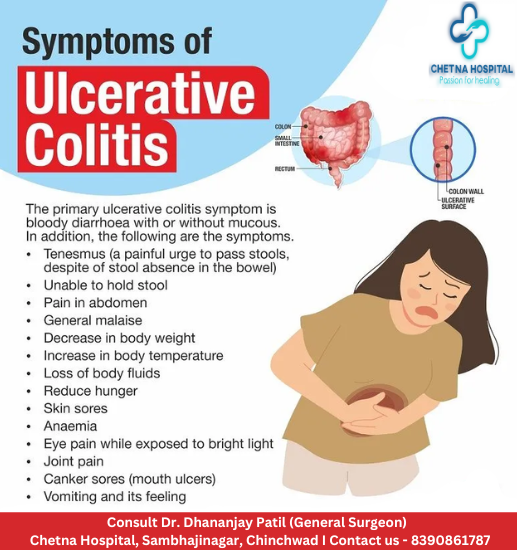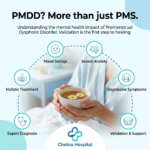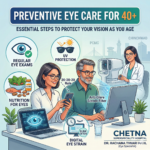Ulcerative Colitis (UC) is a chronic inflammatory bowel disease (IBD) that affects the colon and rectum, causing inflammation and ulcers in the inner lining of the large intestine. While its cause isn’t fully understood, it is believed to involve an abnormal immune response. Recognizing the symptoms early on can help manage the disease more effectively.
Common Symptoms of Ulcerative Colitis:
- Abdominal Pain and Cramping
Persistent pain or cramping, especially in the lower abdomen, is a common symptom. This occurs due to inflammation and ulceration in the colon. - Diarrhea, Often with Blood or Pus
One of the hallmark signs of UC is chronic diarrhea. Stools may contain blood, mucus, or pus due to ulcerations in the colon’s lining. The frequency and urgency to pass stool may increase, disrupting daily life. - Rectal Bleeding
Blood in the stool is common in UC, often resulting from inflammation or ulcers near the rectum. - Weight Loss
Unintentional weight loss can occur due to reduced appetite, malabsorption of nutrients, and persistent diarrhea. - Fatigue
Ongoing inflammation, blood loss, and frequent bowel movements can lead to chronic fatigue, impacting overall energy levels. - Urgency to Defecate
People with UC often feel an urgent need to defecate, which can sometimes result in the inability to control bowel movements. - Fever
During flare-ups, mild to moderate fever can occur as the body responds to inflammation. - Tenesmus
This refers to the sensation of needing to pass stool, even when the bowels are empty, leading to discomfort and frustration.
Less Common Symptoms:
- Joint Pain and Swelling
Some individuals may experience inflammation outside the digestive system, particularly in the joints, leading to arthritis-like symptoms. - Eye and Skin Irritations
Eye inflammation (uveitis) or skin disorders (like ulcers or rashes) can also develop in those with UC.
Managing Symptoms
Ulcerative Colitis is marked by periods of remission and flare-ups. Early diagnosis and treatment, such as medications to reduce inflammation and immune response, can help manage symptoms effectively. In severe cases, surgery may be necessary to remove the affected part of the colon.
For Consultation Contact us on 8390861787
Website – www.chetnahospital.co.in
Address – Chetna Hospital, Sambhajinagar, MIDC, G Block, Near Rotary Club, Chinchwad 411019
.
.
.
#pune#pcmc#chinchwad#hospital#medical#medicalservices#health#healthcare#surgery#generalsurgery#medicalprocedure#generalsurgeon#generalsurgeoninchinchwad













